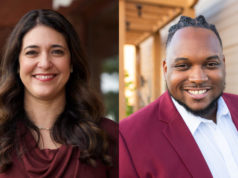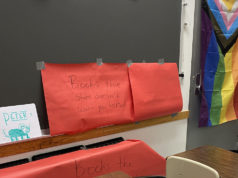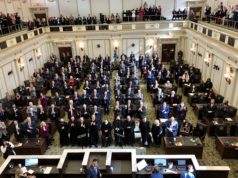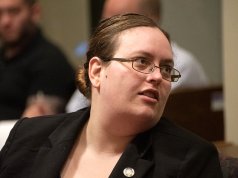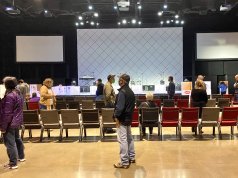During May, the U.S. News and World Report, the Wall Street Journal and The Guardian reported on the best and worst of Oklahoma City’s schools. During the last week of the month, the New York Times re-shared and the New Yorker published laudatory pieces on the efforts by education advocates to improve the entire state (not just our underfunded schools).
Sonic CEO seeks ‘opportunity for everybody’
The Times described Sonic Drive-In CEO Cliff Hudson as a business leader who skillfully navigates today’s political terrain. He attended Northwest Classen High School during the court-ordered desegregation of 1969, and, “That lesson has helped shape Mr. Hudson’s worldview and his management approach at Sonic,” according to the article. Hudson said his high school experience,
… helped me with some sensitivity to the richness and breadth of our society, and that the more you limited yourself, as in the white males only chumming with white males, the more you cut yourself off from that richness.
The Times also reported how Hudson “… has cultivated something of a rarity in corporate America — a management team that is mostly women and minorities and a board that is close to that.” He is a longtime Democratic Party donor, and he has served as chairman of the Securities Investor Protection Corporation, as Oklahoma City School Board chairman and as a Ford Foundation board member. Hudson created an environment,
… where leaders of all sorts can talk about a big tent instead of talking about a divisiveness, and talk about how we approach this so we have opportunity for everybody instead of a divide-and-conquer approach.
#oklaed raises engagement, invades Capitol
The New Yorker article, written by Rivka Galchen from Norman, Oklahoma, also describes great Oklahoma teacher-legislators like Rep. Mickey Dollens (D-OKC), Rep. Jacob Rosecrants (D-Norman) and Rep. Karen Gaddis (D-Tulsa), as well as Sen. Allison Ikley-Freeman (D-Tulsa), a 26-year-old lesbian who decided to run just before the election. “Four years earlier,” reported Galchen, Ikley-Freeman “had been sleeping in her car, homeless, while trying to finish a master’s degree.”
Also described is teacher Carri Hicks:
She had been coming to the capitol for years, using her personal-leave days to advocate for education. She had tried to contact the incumbent in her district, Senator Ervin Yen, a Republican, several times over the years, but had never received a response until she announced her candidacy.
Galchen also reviewed the unprecedented number of recent special elections and how “the Democrats ended up winning four of the nine special elections, all in areas that had voted heavily Republican in 2016.” Moreover, “Two of the four victors were teachers, and if you guess what issue they ran on you’ll be right.”
Galchen wrote, “Every state is politically odd, but I find Oklahoma to be the oddest.” She described teachers as learning the “super-nerdy bit of political subtext,” such as the “ag exemption” for capital gains taxes. They are also realizing how history is changed. John Waldron, a social studies teacher and legislative candidate from Tulsa, was quoted as saying, “The Okies proved it in the Dust Bowl, that they could learn.” Then, “People say they aren’t interested in politics. But then politics happens to them.”
It’s so exciting to watch young and older Oklahomans come together in a potential political turning point. Galchen recounted the experience of 38-year-old Justin Moser and Ryan Robinson, who posted on Facebook about feeling that today’s retrograde politics “was ‘our’ fault”:
By ‘our’ he meant our generation. … Oklahoma has one of the lowest voting rates in the nation, and turnout is especially depressed among young people.
They organized the Frontier Coalition, a Facebook group, “… with the goal of organizing defunct county Democratic parties.”
A closing lesson from the MAPS for Kids era
I greatly admire Dollens, Rosecrants and the other young upstarts who are revitalizing our state, but being a silver-haired Democrat, I’ll close with the lesson that Cliff Hudson taught me: Before I was invited to participate in the Maps for Kids process that Cliff co-chaired, I had never seen a political campaign that tried to unite the entire diversity of our community as opposed to defeating an opponent.
In 2001, after MAPS passed, Hudson visited our classroom. He enthralled John Marshall students – who were both employees and customers of Sonic – with a metaphorical description of his vision for empowering schools. Hudson said that Sonic had sought a common “brand,” but mandates from the corporate office had backfired. Most franchise owners did not have deep feelings in regard to, say, Coke versus Pepsi, but they got their backs up when the corporate office mandated one or the other. Once small business people were treated with respect and empowered, however, they happily went along with efforts to create a common brand.
Hudson sincerely solicited the students’ insights on their life experiences and their views about school. Before long, more than 80 students were engaged in a profound discussion of why site-based management works. The teens offered insights into how respectful cultures at school and on the job could liberate a democratic dynamism.
That morning, we embodied the principles of MAPS for KIDS. We were a true cross-generational learning community. During those hopeful days, it looked like our learning culture could become a model for the entire city.
I think we may be on the verge of a new morning in Oklahoma.












